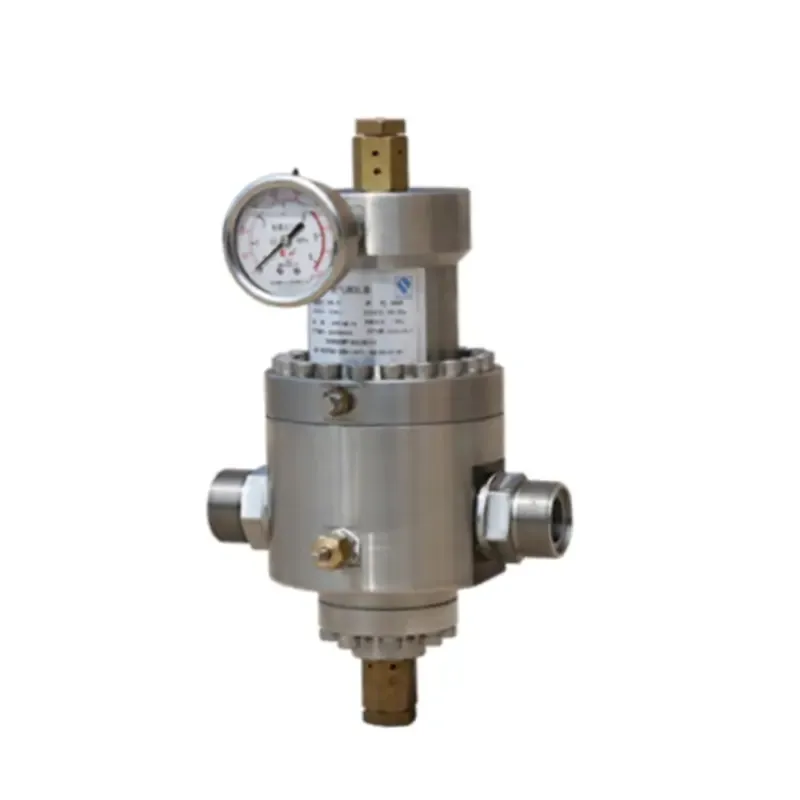
Nov . 09, 2024 23:26
Back to list
Exploring the Functionality and Applications of Pneumatic Valves in Industrial Systems
Understanding Pneumatic Valves A Comprehensive Guide
Pneumatic valves play a critical role in various industrial applications by controlling the flow of compressed air in pneumatic systems. These valves are essential for automating processes that require precise control of air pressure and volume, making them indispensable in sectors such as manufacturing, automotive, and packaging.
What are Pneumatic Valves?
Pneumatic valves are devices that manage the flow of air in a pneumatic system by opening, closing, or regulating the airflow based on the system’s requirements. They can be classified into several types based on their functionality, design, and application. Common types include directional control valves, pressure relief valves, flow control valves, and shut-off valves.
1. Directional Control Valves These valves direct the flow of compressed air to different parts of the system. They typically come in two-way, three-way, or four-way configurations, which denote how many paths the air can take. A three-way valve, for instance, can either allow air to flow in one direction or exhaust it, making it ideal for applications like cylinder actuation.
2. Pressure Relief Valves Safety is paramount in pneumatic systems. Pressure relief valves prevent excessive pressure buildup that could potentially damage equipment or pose safety hazards. They automatically release air when pressure exceeds a predetermined level, ensuring that the system operates within safe limits.
3. Flow Control Valves These valves regulate the speed of actuators and cylinders in the system by controlling the amount of airflow. By adjusting the flow rate, they help achieve desired operational speeds in applications ranging from automation to robotics.
4. Shut-off Valves As the name suggests, shut-off valves are used to stop the airflow completely to certain parts of the system. They are vital in maintaining control over operations and can be operated manually or automatically.
The Importance of Pneumatic Valves in Industries
The utilization of pneumatic valves is widespread due to their efficiency and reliability in controlling air pressure. Some key benefits include
- Precision Control Pneumatic valves provide highly accurate control over air flow and pressure, enabling manufacturers to achieve consistent operational performance.
- Energy Efficiency By regulating the flow of compressed air, these valves help in reducing energy consumption, which can lead to considerable cost savings in industrial operations.
pneumatic valve

- Safety Through pressure relief and shut-off functionalities, pneumatic valves contribute significantly to workplace safety, preventing accidents caused by overpressure or uncontrolled air flow
.- Versatility Pneumatic valves can be designed for specific applications, making them versatile components suitable for a wide range of tasks in automated systems.
Selection Criteria for Pneumatic Valves
When choosing pneumatic valves for a specific application, several factors should be considered
1. Flow Rate Requirements Determine the necessary flow rate based on the application's needs. This will guide the selection of the appropriate valve size and type.
2. Pressure Ratings Understand the operating pressure range of your pneumatic system. Selecting valves that can handle these pressures is critical for reliable operation.
3. Actuation Method Pneumatic valves can be actuated manually, mechanically, or electronically. The choice of actuation method should align with the automation level of the application.
4. Operating Environment Consider the environment in which the valves will be used. Factors like temperature, humidity, and exposure to corrosive substances can affect the valve's performance and durability.
5. Maintenance Needs Some valves require more maintenance than others. Selecting a valve type that fits your maintenance capabilities is essential for long-term reliability.
Conclusion
Pneumatic valves are integral components of modern automation technology, providing critical control over compressed air systems. Their diverse functionalities, coupled with advancements in technology, continue to enhance efficiency and safety in various industrial applications. Understanding the types, benefits, and selection criteria for pneumatic valves can empower industries to optimize their operations, ensuring they remain competitive in an ever-evolving market. Whether through improving energy efficiency, ensuring safety, or enhancing precision in processes, pneumatic valves are foundational to the success of automated systems.
Latest news
-
Safety Valve Spring-Loaded Design Overpressure ProtectionNewsJul.25,2025
-
Precision Voltage Regulator AC5 Accuracy Grade PerformanceNewsJul.25,2025
-
Natural Gas Pressure Regulating Skid Industrial Pipeline ApplicationsNewsJul.25,2025
-
Natural Gas Filter Stainless Steel Mesh Element DesignNewsJul.25,2025
-
Gas Pressure Regulator Valve Direct-Acting Spring-Loaded DesignNewsJul.25,2025
-
Decompression Equipment Multi-Stage Heat Exchange System DesignNewsJul.25,2025

